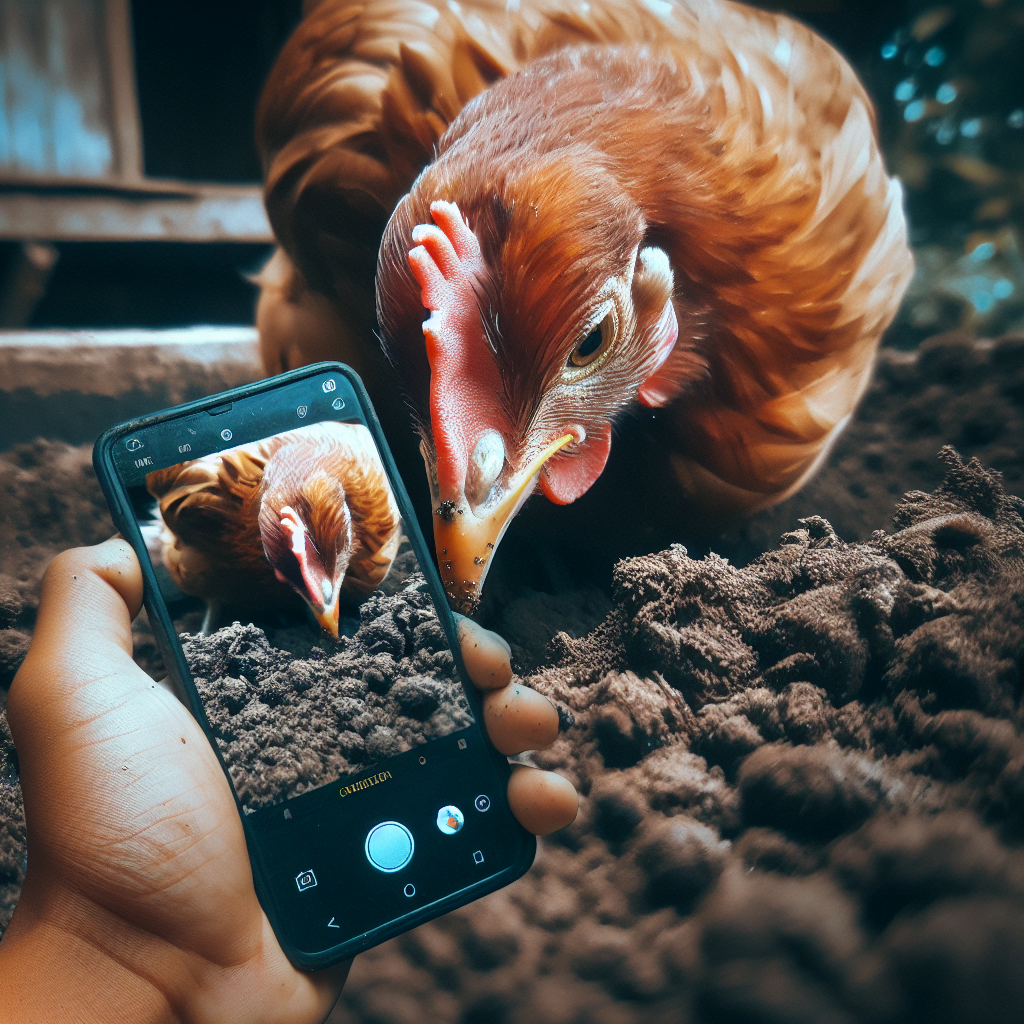If you’ve ever wondered how you can make a positive impact on the world’s poultry industry, you’re not alone. In fact, many people are becoming increasingly concerned about the ethical and environmental implications of the poultry industry and are actively seeking ways to contribute to more sustainable practices. Whether you’re a conscious consumer, an aspiring farmer, or simply someone who wants to be part of the solution, there are numerous ways you can play a role in creating a more sustainable and ethical poultry industry. From supporting local and organic producers to practicing mindful consumption, every small action counts towards a better future for both chickens and the planet. So, let’s explore some practical steps you can take today to contribute to a more sustainable and ethical poultry industry.
1. Understanding the Current State of the Poultry Industry
1.1 Importance of Sustainable and Ethical Practices
In recent years, there has been a growing emphasis on the importance of sustainable and ethical practices in the poultry industry. This shift is driven by a recognition of the potential negative impacts of conventional farming methods on the environment, animal welfare, and human health. Sustainable and ethical practices aim to prioritize the wellbeing of animals, minimize environmental harm, and promote the production of safe and nutritious poultry products.
1.2 Issues in the Poultry Industry
While the poultry industry plays a crucial role in meeting the global demand for meat and eggs, it is not without its challenges. One of the primary concerns is the intensive farming methods employed by large-scale commercial operations. These practices often involve overcrowding, the use of antibiotics and hormones, and poor waste management, which can lead to adverse effects on animal welfare and the environment. Additionally, the mass production of poultry products can contribute to deforestation, water pollution, and greenhouse gas emissions.
1.3 Impact on Environment and Animals
The poultry industry’s environmental impact extends beyond the direct consequences of farming practices. The production and transportation of poultry feed, energy consumption, and waste management all contribute to carbon emissions and ecological degradation. Moreover, animals raised in inhumane conditions are prone to stress, disease, and injury, resulting in lower overall welfare. Recognizing the negative consequences of these practices is the first step towards promoting sustainability and ethicality within the industry.
2. Supporting Local and Organic Poultry Farms
2.1 Benefits of Local and Organic Farms
Supporting local and organic poultry farms is an effective way to contribute to a more sustainable and ethical industry. Local farms often prioritize animal welfare, practice pasture-based farming, and reduce transportation distances, thereby reducing carbon emissions. Organic farms, on the other hand, adhere to strict standards that prohibit the use of antibiotics and synthetic pesticides, promoting healthier and more natural farming practices. By choosing products from these farms, you can help create a market demand for sustainable poultry farming methods.
2.2 Choosing Ethically Raised Poultry Products
When purchasing poultry products, it is crucial to pay attention to how the animals were raised. Look for labels such as “free-range,” “pasture-raised,” or “Certified Humane” to ensure that the animals had access to outdoor spaces, were not confined in overcrowded conditions, and were treated with respect and care. These labels indicate that the farmers have implemented ethically responsible practices and are committed to the welfare of the animals they raise.
2.3 Reducing Environmental Footprint
Supporting local and organic farms not only promotes ethical practices but also helps reduce your environmental footprint. By purchasing poultry products from nearby farms, you reduce the distance traveled for transportation, which in turn reduces carbon emissions. Additionally, organic farming practices prioritize soil health, biodiversity, and water conservation, contributing to long-term environmental sustainability. By making conscious choices, you can actively contribute to a more sustainable and ethical poultry industry.
3. Advocating for Change in the Poultry Industry
3.1 Raising Awareness and Educating Others
To drive meaningful change in the poultry industry, it is essential to raise awareness and educate others about the importance of sustainable and ethical practices. Engage in conversations with friends, family, and coworkers, sharing information about the positive impacts of supporting local, organic, and ethically raised poultry products. Utilize social media platforms, blogs, or local community groups to spread the word and encourage others to make informed choices.
3.2 Supporting Animal Welfare Organizations
Another effective way to advocate for change is by supporting animal welfare organizations that work towards improving the conditions for poultry. These organizations conduct research, lobby for better regulations, and provide resources to farmers interested in transitioning to more ethical farming methods. By donating, volunteering, or participating in their campaigns, you can play an active role in promoting positive change within the poultry industry.
3.3 Influencing Policy and Regulations
In order to achieve long-lasting and widespread change, it is crucial to influence policy and regulations related to the poultry industry. Stay informed about local, national, and international legislation regarding animal welfare, environmental protection, and food safety regulations. Participate in public consultations, write to elected officials, and join advocacy groups that work towards implementing stricter standards and promoting sustainable and ethical poultry farming practices. Your voice can have a significant impact on shaping policies that prioritize the wellbeing of animals, the environment, and consumers.
4. Promoting Sustainable Poultry Feed Practices
4.1 Understanding the Impact of Feed Choices
Feed choices play a significant role in the sustainability and ethicality of poultry production. The conventional poultry feed industry often relies on crops such as soybeans, corn, and wheat, which can contribute to deforestation, habitat destruction, and excessive pesticide use. Understanding the environmental impact of poultry feed and exploring alternative options is crucial for promoting sustainability in the industry.
4.2 Encouraging Alternative Protein Sources
One way to promote sustainable feed practices is by encouraging the use of alternative protein sources. Insects, algae, and single-cell proteins derived from microbial sources have the potential to provide a nutritious and environmentally-friendly alternative to traditional feed ingredients. These alternative protein sources require fewer natural resources, emit fewer greenhouse gases, and often have a lower environmental impact compared to traditional crops. By supporting research and development in this area, you can contribute to the adoption of more sustainable feed practices within the poultry industry.
4.3 Minimizing Food Waste
Another aspect of sustainable poultry feed practices is reducing food waste throughout the supply chain. The poultry industry can play an active role in minimizing waste by utilizing by-products from food processing, implementing efficient storage and distribution systems, and supporting initiatives that divert food waste from landfills to alternative uses, such as composting or conversion into animal feed. By advocating for responsible food waste management, you contribute to a more sustainable and efficient poultry industry.
5. Reducing Food Waste at Home
5.1 Proper Storage and Meal Planning
Reducing food waste at home is not only beneficial for the environment but also for your wallet. Proper storage and meal planning can help prevent perishable poultry products from spoiling before they can be consumed. Ensure that your refrigerator is set at the appropriate temperature to prolong the freshness of poultry products, and be mindful of expiration dates. Plan your meals in advance, considering portion sizes and leftovers, to avoid overbuying and minimize food waste.
5.2 Creative Use of Leftovers
Leftovers can be transformed into delicious meals, reducing waste and extending the life of poultry products. Use leftover chicken or turkey to make sandwiches, salads, or stir-fries, or incorporate them into casseroles and soups. Get creative with recipes and explore new flavor combinations to make the most of your leftovers and minimize food waste.
5.3 Composting Food Scraps
Composting is an excellent way to reduce food waste and benefit the environment. Instead of throwing away food scraps, such as vegetable peels and chicken bones, compost them to create nutrient-rich soil for your garden. Composting not only reduces the amount of waste sent to landfills but also contributes to the health of the soil and promotes sustainable gardening practices.
6. Choosing More Sustainable Packaging Options
6.1 Packaging and Its Environmental Impact
Packaging has a significant environmental impact, considering the resources required for its production, the energy consumed during transportation, and the waste generated after use. Plastic packaging, in particular, poses a significant threat to ecosystems, contributing to pollution and endangering wildlife. Understanding the environmental consequences of packaging can help guide your choices towards more sustainable options.
6.2 Opting for Eco-Friendly Packaging
When choosing poultry products, opt for packaging that is eco-friendly and sustainable. Look for products packaged in materials such as recycled paper, cardboard, or biodegradable alternatives to plastic. Additionally, consider purchasing products in bulk to reduce overall packaging waste. By supporting companies that prioritize eco-friendly packaging practices, you encourage the adoption of sustainable packaging alternatives within the poultry industry.
6.3 Supporting Companies with Ethical Packaging Practices
Supporting companies that prioritize ethical packaging practices is an important step towards promoting sustainability in the poultry industry. Look for companies that are transparent about their packaging choices and actively work towards reducing waste, using renewable materials, and implementing recycling programs. By making informed purchasing decisions, you contribute to a market demand for sustainable packaging options, prompting other companies to follow suit.
7. Supporting Poultry Industry Research and Innovation
7.1 Funding Research for Sustainable Practices
Supporting research and innovation in the poultry industry is crucial for driving sustainable change. By donating to research institutions, universities, or nonprofit organizations focused on poultry farming, you can contribute to the development of more sustainable farming practices, feed alternatives, waste management solutions, and animal welfare initiatives. Your financial support is an investment in a more sustainable and ethical future for the poultry industry.
7.2 Embracing Technological Advancements
Advancements in technology have the potential to revolutionize the poultry industry and foster sustainability. From precision farming techniques to automated waste management systems, technology can help optimize resource usage, reduce environmental impacts, and improve animal welfare. Stay informed about emerging technologies in the poultry industry, support companies that embrace innovation, and advocate for the implementation of sustainable technologies in poultry farming practices.
7.3 Collaborating with Industry Experts
Collaboration with industry experts, farmers, scientists, and researchers is essential for driving meaningful change in the poultry industry. Engage in dialogues, attend conferences, workshops, and webinars to learn from and collaborate with experts in the field. By fostering relationships and sharing knowledge, you can play an active role in shaping and implementing sustainable practices in the poultry industry.
8. Investing in Sustainable Poultry Farming Practices
8.1 Implementing Efficient Waste Management Systems
Efficient waste management systems are essential for reducing the environmental impact of poultry farming. By implementing proper waste management strategies, such as composting, anaerobic digestion, or biogas production, poultry farms can minimize waste, generate renewable energy, and produce nutrient-rich fertilizers. Investing in and promoting these sustainable waste management practices is crucial for creating a more environmentally friendly poultry industry.
8.2 Adopting Renewable Energy Sources
Transitioning to renewable energy sources is an effective way to reduce the carbon footprint of poultry farms. Solar panels, wind turbines, and biogas reactors can provide clean energy to power poultry facilities, reducing dependency on fossil fuels and minimizing greenhouse gas emissions. Encourage and support poultry farms in adopting renewable energy technologies to create a more sustainable and resilient industry.
8.3 Using Precision Farming Techniques
Precision farming techniques utilize technology and data to optimize farming practices, minimize resource usage, and improve animal welfare. By employing sensors, automation, and real-time monitoring, poultry farmers can ensure efficient use of feed, water, and energy, while also enhancing animal health and reducing environmental impacts. Investing in precision farming technologies and promoting their adoption is key to fostering sustainability in the poultry industry.
9. Encouraging Transparency and Traceability in the Industry
9.1 Demanding Clear Labeling and Certification
Transparency and traceability are essential for promoting sustainability and ethicality in the poultry industry. Demand clear labeling and certification systems that provide accurate information about the farming practices, origin, and ingredients of poultry products. Look for certifications such as “Organic,” “Certified Humane,” or “Animal Welfare Approved” to ensure the products you purchase meet specific standards. By demanding clear labeling and certification, you support transparency and empower consumers to make informed purchasing decisions.
9.2 Supporting Industry Efforts for Transparency
Supporting industry-led initiatives that promote transparency and traceability is crucial for driving change from within the poultry industry. Many organizations and alliances are working to establish standards, certifications, and auditing systems that ensure ethical practices and environmental responsibility. By supporting these efforts, advocating for stricter regulations, and holding companies accountable for their actions, you contribute to a more transparent and responsible poultry industry.
9.3 Making Informed Purchasing Decisions
Ultimately, making informed purchasing decisions is one of the most impactful ways to contribute to a more sustainable and ethical poultry industry. Educate yourself about various certifications, farming practices, and packaging options, and choose products that align with your values and priorities. By supporting companies that prioritize sustainability, ethicality, and transparency, you create a demand for responsible practices within the poultry industry, influencing the producers and retailers to follow suit.
10. Educating and Empowering Consumers
10.1 Engaging in Consumer Advocacy
As a consumer, your voice is powerful. Engage in consumer advocacy by supporting and joining organizations that promote sustainable and ethical practices in the poultry industry. Participate in campaigns, sign petitions, and raise your concerns with companies and policymakers. By voicing your opinions and demanding change, you contribute to a collective effort to shape the poultry industry in a more sustainable and ethical direction.
10.2 Sharing Information and Resources
Share information and resources about sustainable and ethical poultry practices with your friends, family, and community. Use social media platforms, local newsletters, or community events to spread awareness and educate others about the importance of making conscious choices in the poultry industry. By sharing your knowledge, you empower others to contribute to a more sustainable and ethical future.
10.3 Supporting Consumer Education Programs
Support consumer education programs that aim to inform and empower individuals to make sustainable choices in their daily lives, including poultry consumption. These programs can provide resources, workshops, and educational campaigns to raise awareness about the impact of consumer choices on the poultry industry and the environment. By supporting and participating in these initiatives, you contribute to a more environmentally conscious and responsible society.
In conclusion, contributing to a more sustainable and ethical poultry industry requires a collective effort from consumers, farmers, policymakers, and industry stakeholders. By understanding the current state of the industry, supporting local and organic farms, advocating for change, promoting sustainable feed practices, reducing food waste, choosing sustainable packaging options, supporting research and innovation, investing in sustainable farming practices, encouraging transparency and traceability, and educating and empowering consumers, we can create a more sustainable and ethical future for the poultry industry. Your choices and actions matter, and together we can contribute to a positive transformation in the way poultry is produced and consumed.




